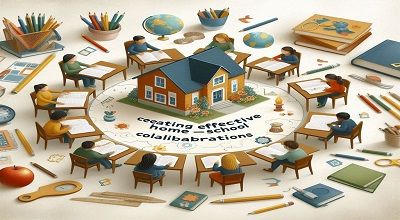Effective Home-School Collaborations
Creating effective home-school collaborations is essential for supporting the holistic development of students. Here are some strategies to foster strong partnerships between home and school:
- Open Communication Channels: Establish open lines of communication between teachers and parents. This can include regular emails, newsletters, phone calls, or apps for messaging. Ensure that both parties feel comfortable reaching out to discuss any concerns or share updates about the student’s progress.
- Parent Orientation and Workshops: Host orientation sessions or workshops at the beginning of the school year to familiarize parents with the curriculum, classroom policies, and ways they can support learning at home. Offer workshops on topics such as effective study habits, supporting literacy and numeracy, and understanding child development.
- Home-School Agreements: Develop agreements that outline the roles and responsibilities of both parents and teachers in supporting the student’s education. This could include commitments to regular communication, attendance at parent-teacher conferences, and participation in school events.
- Parent Involvement Opportunities: Provide various opportunities for parents to get involved in school activities, such as volunteering in the classroom, participating in parent-teacher associations, or attending school events and field trips. Recognize and appreciate their contributions to the school community.
- Individualized Support Plans: Collaborate with parents to develop individualized support plans for students with specific learning needs or challenges. This may involve setting goals, identifying strategies for support both at home and in the classroom, and monitoring progress together.
Read More…
- Regular Progress Updates: Keep parents informed about their child’s academic progress, behavior, and social-emotional development through regular progress reports, parent-teacher conferences, or online portals. Provide specific feedback and suggestions for areas of improvement.
- Shared Resources and Materials: Share resources, tips, and materials with parents to help them support their child’s learning at home. This could include suggested reading lists, educational websites, and activities that reinforce classroom learning.
- Respect Cultural and Linguistic Diversity: Recognize and respect the cultural and linguistic diversity of families. Ensure that communication materials are accessible and culturally sensitive, and provide support for families whose first language may not be English.
- Conflict Resolution Mechanisms: Establish clear protocols for addressing conflicts or disagreements that may arise between parents and teachers. Encourage open dialogue, active listening, and a collaborative approach to problem-solving.
- Celebrate Achievements Together: Celebrate student achievements and milestones collaboratively, both at home and at school. Recognize progress and effort, not just academic success, to foster a positive and supportive learning environment.
Final Words
By implementing these strategies, schools can strengthen partnerships with families and create a supportive ecosystem where students can thrive academically, socially, and emotionally.
